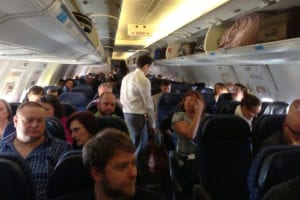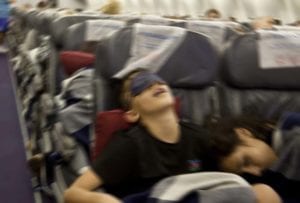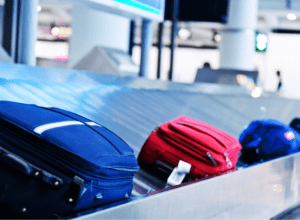Passenger compensation is generous for baggage and adequate for denied boarding. But, there are no payments today for delays and cancellations.
 In the US, if your flight is delayed or canceled, or if your baggage gets lost or damaged, unfortunately, airlines aren’t required to do much for you.
In the US, if your flight is delayed or canceled, or if your baggage gets lost or damaged, unfortunately, airlines aren’t required to do much for you.
But it’s important to know your rights — however limited — if an airline strands you, delays you for hours, or loses your stuff.
We describe here what airlines are required to do for passengers who have booked flights scheduled to fly to, from, or within the United States. You may have additional rights for international tickets provided by another country or the EU.
If your flight is canceled
 Although carriers are required to provide full refunds, if requested, for canceled flights, they do not have to provide any additional compensation (such as meal vouchers, reimbursement for increased costs to rebook with a different airline, etc.).
Although carriers are required to provide full refunds, if requested, for canceled flights, they do not have to provide any additional compensation (such as meal vouchers, reimbursement for increased costs to rebook with a different airline, etc.).
If your flight is canceled, airlines usually will try to rebook you for free on another one of its planes, but at busy travel times, there might not be seats available anytime soon, possibly for days.
Legacy airlines and their partners (Alaska, American, Delta, JetBlue, United) might be willing to rebook you for free with a different carrier, but they’re not required to take this step — you often must ask.
If you do not accept the airline’s proposed new itinerary, you are legally entitled to a full refund for the unused portion of your ticket — even if you booked a “nonrefundable” fare. The airline must also refund your prepaid fees, such as for baggage or seat assignment.
“It’s the only real right you have; the only DOT rule that covers any kind of flight disruption with flights within the United States,” said William McGee, a senior fellow for aviation and travel at the non-profit American Economic Liberties Project. “In Canada and the European Union, there are pages and pages of regulations that spell out what an airline must do when passengers are inconvenienced. Those rules are easily summarized in plain language for passengers to understand.”
If offered flight credits or frequent flier miles, always ask for cash.
But instead of automatically supplying refunds, airlines typically offer stranded passengers only travel credits/vouchers for future travel. You do not have to accept such an offer. If your flight is canceled, for any reason — weather, mechanical problems, air-traffic control, staffing issues, computer glitches, volcanic eruptions, whatever — the airline must give you your money back, if you ask for that.
“A cash refund is always a smart move because you may have to jump through hoops to use that travel voucher,” said Charlie Leocha, president and founder of Travelers United, a consumer advocacy group. “Travel vouchers can expire, be subject to restrictions, and have blackout dates. And remember, that voucher can only be used with that airline. What if you want to fly another airline next time?”
Although not required, airlines often will give stranded passengers vouchers for meals and hotel rooms, if requested. But don’t expect to get reimbursed for large monetary losses resulting from a canceled flight, such as missing a cruise.
If your flight is delayed

But if your delay is significant, under DOT regulations you might be entitled to a full refund if you decide not to continue with your original itinerary or accept a rebooking offer from the airline. The problem is the DOT doesn’t define what “significant delays” means; each airline gets to decide that.
In August 2022, the DOT proposed a rule that would better spell out what constitutes a significant delay, requiring airlines to compensate any passenger affected by one. It proposes that delays be deemed significant if:
- Departure and/or arrival times are delayed by three hours or more for a domestic flight, six hours or more for an international one.
- Departure or arrival airport changes.
- Increase in the number of connections in the itinerary.
- Changes to the type of aircraft flown if it causes a significant downgrade in the air travel experience or amenities available onboard the flight.
If the DOT’s proposed rule is approved (it could take several years), passengers experiencing these disruptions would be entitled to flight credits or vouchers that never expire.
If you get bumped
Unlike cancellations and delays, airlines are required to compensate passengers who are involuntarily denied boarding (get “bumped”) from oversold flights.
Before bumping passengers, airlines usually ask for volunteers and offer flight credits as incentives to get people to give up their seats. But if there aren’t enough volunteers, they are allowed to bump you.
If you are denied boarding because the airline deems that you checked in for your flight too late, arrived at the departure gate too late, or it can find a way to get you to your destination within one hour of your original scheduled arrival time, it does not have to provide any compensation for bumping you.
Otherwise, in most situations, if you get involuntarily bumped, the airline is required to provide you with monetary compensation based on formulas set by the DOT. For domestic flights, the amount is calculated as 200 percent of the one-way fare, up to $775 if the resulting delay is one or two hours; the compensation jumps to 400 percent of the one-way fare, up to $1,550, if the delay is more than two hours. Airlines are required to provide this compensation on the same day they bumped you.
If your bags are lost, damaged, or delayed

You may be required to produce receipts or other proof for valuable items that were in the lost bags. Domestic airlines often exclude liability for perishable and fragile items, as well as cash, electronics, and jewelry. If you must put valuables in your checked luggage (and it’s best avoided) consider buying additional insurance.
For international travel (including the domestic segment of an international itinerary), airlines are responsible for anything in checked luggage, even when not disclosed in advance by the passenger.
Lost luggage may be worth up to $3,800 per passenger.
If a bag or its contents are damaged while under an airline’s control, the airline is responsible for repairs or reimbursing the passenger. The airline is not liable for preexisting damage, or if the damage was caused by improper packing. When the damage cannot be repaired, expect the airline to negotiate compensation based on the depreciated value of the luggage.
Airlines must compensate passengers for “reasonable, verifiable, and actual incidental expenses” that were incurred while their bags are delayed, up to the $3,800 per passenger liability limit. DOT regulations prohibit airlines from setting an arbitrary daily amount for interim expenses, such as $50 a day for each day a bag is delayed.
If you have an assistive device (walker, wheelchair, or other piece of equipment that assists you with a disability) and it gets lost, destroyed, or damaged, standard liability limits do not apply. For domestic flights, the airline’s liability for an assistive device that is lost or destroyed is the original purchase price.
If you encounter a cancellation or delay, complain
Although they’re not required to do so, airlines sometimes provide travel credits to stranded or delayed passengers, especially if the problem was of the airline’s own making. If you experience a delay of more than three or four hours due to staffing shortages, mechanical delays, or similar reasons, complain in writing to the airline and request reasonable compensation for your trouble. Mention any increased travel costs due to the delay, too.
If an airline refuses a reasonable request for compensation, and the flight was to, from or within the US, file a complaint with the Department of Transportation. The DOT won’t directly assist you with your situation, but at least its database will reflect what problems need to be addressed, and it might get the airline’s attention.
When dealing with Canadian airlines, file a complaint with the Canadian Transportation Agency. Visit the EU’s Your Europe page for airlines based in the European Union. For those based in the United Kingdom, contact the UK Civil Aviation Authority.
How to check on each airline’s policies
The Department of Transportation’s online Airline Customer Service Dashboard reports what the 10 largest US airlines (and their regional operating partners) say they will do — if possible — for their passengers when a flight is delayed or canceled due to circumstances within the airline’s control. This would include disruption caused by maintenance, equipment, or crew problems, but not weather or air traffic control problems.
You can use the dashboard to see if your airline has promised to provide meal vouchers when a flight is delayed for more than three hours, offer hotel accommodations when there’s an overnight cancellation/delay, or try to rebook you on another airline at no additional cost.
Keep in mind: These are customer service commitments for customers who request relief; they are not guaranteed or required by any federal rule or regulation. Only Delta Airlines has included its customer service commitments in its “contract of carriage,” the legal agreement between the airline and the ticketholder.
Other countries have different rules

If you experience a delay of more than two hours, ask the airline if you are entitled to compensation and, if so, find out how to apply for it.
For more information from the DOT
- Flight Delays & Cancellations
- Lost, Delayed, or Damaged Baggage
- Fly Rights: Consumer Guide to Air Travel
READ ALSO:
How to easily prevent fines and worse when you return through US customs
Top Stories of 2022 on Travelers United

ConsumerMan Herb Weisbaum is one of America’s top consumer experts. He’s been helping consumers for more than 35 years. Herb’s Emmy award-winning television reports have exposed everything from quack medications to bogus investments. Herb covers the consumer beat for NBC News Digital. His stories on NBCNews.com warn readers about scams, bad deals, dangerous products and false advertising. You’ll find those stories posted on the ConsumerMan website for easy reference. He’s also the Consumer Reporter at KOMO Radio in Seattle.



